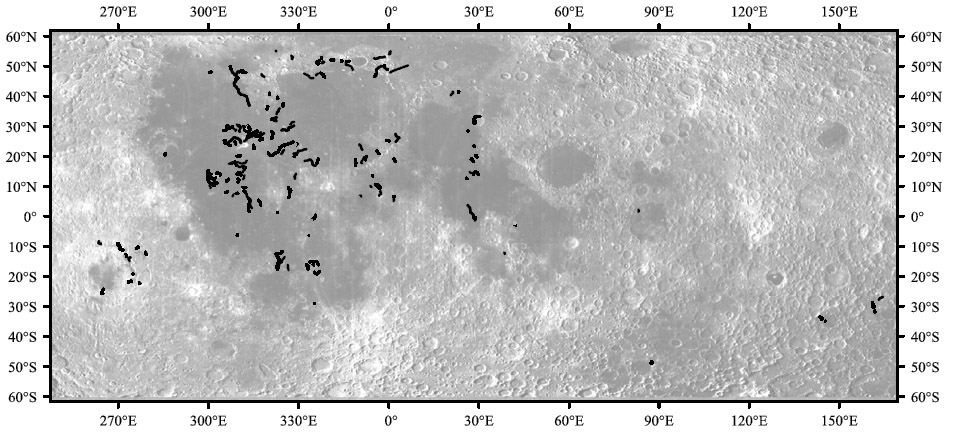May 5, 2013
How Many Sinuous Rilles Are On the Moon?

image from Hurwitz, Head and Hiesinger (2013)
Debra Hurwitz knows there are 194 because she has measured and described each one using LRO WAC and Kaguya Terrain Camera (6 m resolution) images. A recent paper by Hurwitz and Jim Head and Harry Hiesinger (presumably her thesis advisors) includes this map and a comprehensive catalog of these rilles and statistics about their locations and sizes. There are two types of rilles on the Moon - tectonic ones such as the Ariadaeus Rille that formed by downdropping of a trough between parallel normal faults, and sinuous rilles. There is not a modern catalog of tectonic rilles but I imagine sinuous rilles are more numerous because every lava eruption may have included them. Sinuous rilles form in lava flows, in fact, they are often channels or tubes that distribute lavas away from their source regions. In 1972 Dale Cruikshank and I compared lunar sinuous rilles to active lava channels and tubes we observed in Hawaii. Sinuous rilles may start as channels but they deepen by mechanical erosion of the material they flow over and/or they melt the underlying material. In a previous work Hurwitz and colleagues demonstrated that thermal erosion is the main mechanism for forming sinuous rilles on maria, and that mechanical erosion is more important for rilles like those around Plato that cut through unconsolidated ejecta. This new rille paper includes summary statistics and extremes. For example, the average length, width and depth of sinuous rilles are 33 km, 480 m and 49 m. The widest and deepest rille is Schröter's Valley and the longest is the Sharp Rille. Not surprisingly, rille ages are the same as the lava flows they helped form, mostly between 3.8 and 3.0 b.y. ago. The concentration of rilles in western maria is essentially a map of the Procellarum KREEP Terrane (PKT), as pointed out previously.
Chuck Wood
Related Link
Debra M.Hurwitz, James W.Head and Harald Hiesinger (2013) Lunar sinuous rilles: Distribution, characteristics, and implications for their origin. Planetary and Space Science 79–80, 1–38.
Yesterday's LPOD: Topographic Revelations
Tomorrow's LPOD: Seeing in the Round
COMMENTS?
Register, Log in, and join in the comments.



